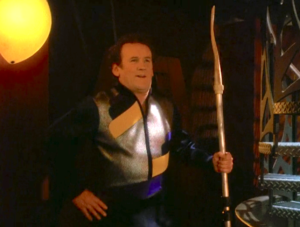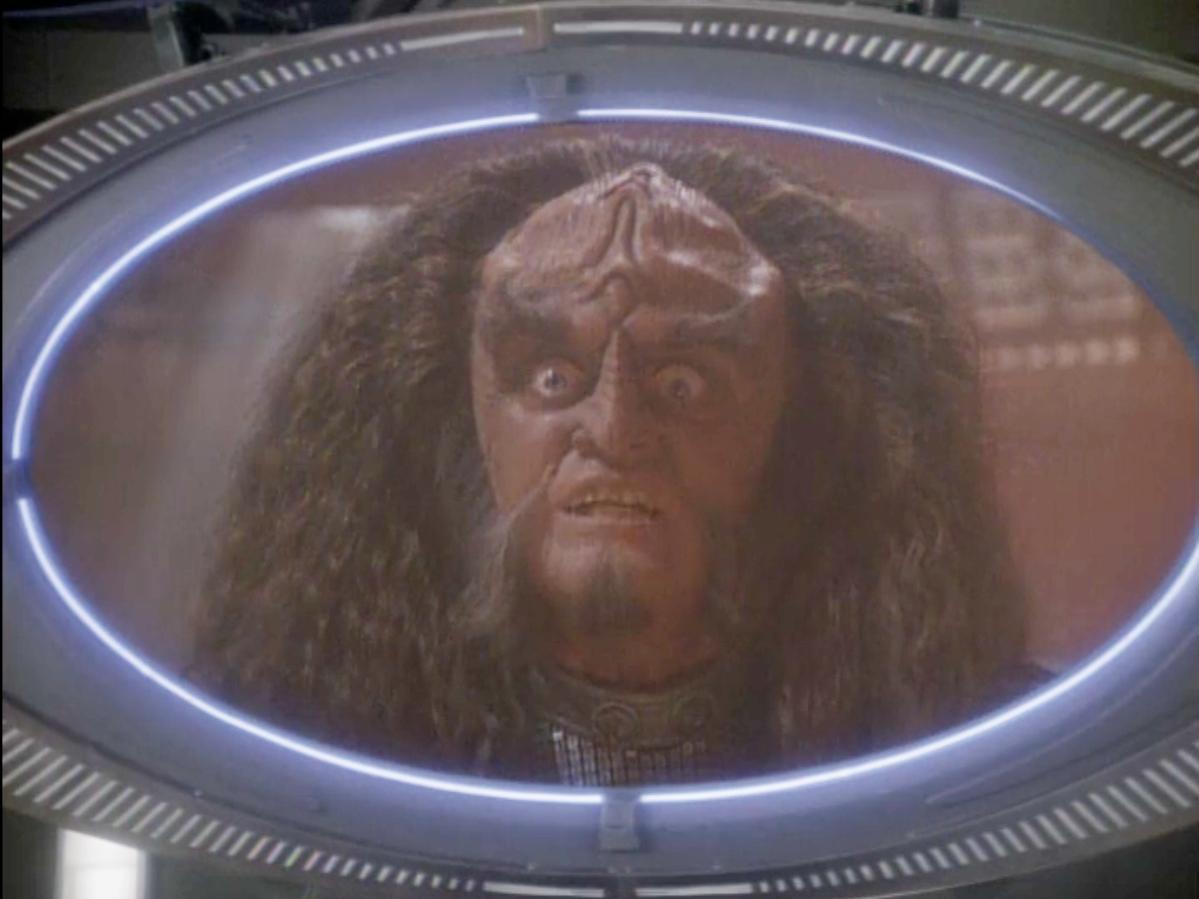 S5E24, “Empok Nor” (Bryan Fuller/Hans Beimler)
S5E24, “Empok Nor” (Bryan Fuller/Hans Beimler)
Once in a while Trek gets it in its head to try making a full-on action show, ignoring its usual strengths of characterization, plotting, and worldbuilding for 45 minutes of everyone chasing each other around with phaser rifles. This never goes well. Sadly nothing different here, I don’t think this one really brings much of anything to the table. Some of its main problems:
- First and foremost, it’s boring. K and I both missed bits and pieces in favor of dozing. Poor pacing, too much meandering around in the dark, too much technobabble.
- They introduce a tantalizing backstory about O’Brien’s long ago days as an infantry man. Apparently he killed so many Cardassians in some battle that Garak considers him something of a legend. But it’s never fleshed out. I’m not sure it made sense for Garak anyway, he’s usually awfully reticent to discuss anything about the past. Although I did like how O’Brien kept insisting he’s not a soldier anymore, he’s an engineer, and that’s ultimately how he defeats Drug-crazed Garak.
- The “someone accidentally touches a foreign goop that makes them insane” trope is the TOS-est thing we’ve seen in forever.
- The plot setup is ridiculous. They can only use *one* kind of material to fix the issue on DS9? *One* type of material in the whole universe? And it only exists on a fortunately-existing duplicate station? And it’s unfathomably dangerous so let’s send two guards plus Nog as the full security complement.
Also: the teaser’s humor is a total whiff, the soundtrack is the blandest action movie derivative, both the highly-trained bodyguard types make ludicrous tactical mistakes and immediately die (taking their just-backstoried-enough-to-make-it-sad engineer protectorates with them).
Maybe the only interesting thing here is that reading up on the episode finally prompted me to see what else Andrew Robinson had done, and I learned that he was the psychotic bad guy from the original Dirty Harry. After that he constantly had to work against being typecast as crazy, so he didn’t like having to do that for this episode. I don’t blame him.
Overall: Discard into the same bin as TNG’s “Starship Mine” and below-30th-percentile TOS. 1 out of 5.
S5E25, “In the Cards” (Truly Barr Clark & Scott Neal/Ronald D. Moore)
You know you’ve got a good farce rolling when the protagonists—in this case, Jake and Nog—are confronted by an authority figure (Sisko) who has started to sniff out their scheming and threatens to derail everything, and when they try to calmly, rationally explain things to him, not one shred of it makes them sound like they haven’t lost their minds. There’s an art to delicately accumulating absurdity such that the audience keeps buying in until it gets to a point where they can simply review what’s happened so far for laughs.
“In the Cards” is as good a ridiculous Jake & Nog farce as we’ve had in the series, and definitive proof DS9 can do some good comedy. Some of this is from its brilliant script. Their primary quest to obtain a baseball card to cheer up Sisko snowballs into a series of hijinks and tedious chores as they negotiate with O’Brien, Worf, Kira, and Bashir to help them scrape together all the junk Giger needs for his cellular entertainment device. It’s spawned from a miserable dinner where everyone’s depressed because we’re nearing the end of the season and things are bound to get serious soon, and by the end they’ve not only snagged the card but boosted everyone’s spirits.
But the episode also succeeds in its little touches. I loved this exchange:
Giger: “Let me ask you both a simple question. Do you want to die?”
Nog: “No.”
Jake: “Not really.”
The words don’t exactly capture it. At this point we don’t know Giger any more than Jake and Nog. He’s just the mysterious figure who outbid them for the lot with their baseball card at the antiques auction. They find him squirreled away in his quarters surrounded by bizarre lab equipment. He’s intense and inscrutable and gets in their faces to ask his question, apparently in earnest. Nog’s “no” comes out sorta like he’s saying “Are you seriously asking me this?” but Jake’s is pure skeptical “I’m not telling this nut anything he might want to hear.” But Giger doesn’t really listen to their answers anyway, he runs right over Jake’s tepid “not really” with an “Of course you don’t!” and the further explanation he can’t wait to tell them. It’s early-Seinfeld level perfect comic timing. Maybe this comes from guest director Michael Dorn, who I always think has such good natural timing he even makes Worf funny.
Somewhere along the way Jake and Nog even manage to intersect with the much more serious B story about a probable Dominion invasion and the fate of poor Bajor. There’s actually not much accomplished there other than some establishment of Bajor’s tenuous position and the likelihood of war. Jake and Nog aren’t about to deal with that, but I loved the reversal of the usual DS9 structure of an important A story paired with a silly B story. Today we are all in on the farce. Emphasizing this, Memory Alpha tells me that an early version of the script had Giger motivated to cheat death (or even reverse it) after his wife had died. But they threw it out because it made him sympathetic. Exactly the right choice.
Morn watch: Morn buys a velvet painting.
Overall: Trek farce done perfectly. 5 out of 5.
S5E26, “Call to Arms” (Ira Steven Behr & Robert Hewitt Wolfe)
The war panic that pushed Morn into a frenzy has gripped the entire station, minus the nudity and bar stool assaults, so far as we are aware. Understandable, as DS9ers observe wave after wave of Jem’Hadar fleets pour through the wormhole, like unto a Zapp Brannigan strategy to defeat killbots. Much of this episode is something of a checklist of war prep to-dos. People are rushing to get engaged and flee, get married and flee, or sending their spouses and families fleeing. Quark has stashed crates and crates of Yamok sauce for the expecting Cardassian re-occupation. Tactics-wise I’m surprised no one brought up collapsing the wormhole, which has surfaced here and there as an option when it seems like there’s nothing else to be done. But they settle on developing an elaborate minefield that is somehow self-replicating (with what matter exactly, in the vacuum of space, my 21st century brain can only speculate about). It’s effective enough to prevent more troops or re-supplies and antagonize Dukat, which can always be considered at least a partial victory.
Most relevant is the Bajorans reaching a non-aggression pact with the Dominion, which will keep them out of the war entirely. Weyoun tells us repeatedly that the Dominion will never break it, which further antagonizes Dukat, who totally would’ve broken it. The pact enables much of the DS9 population to bail for the Bajor rather than stick around for the station’s re-occupation. But it also further compromises what Dukat really wants here, which is to use his newly-built alliance to wipe out all his enemies. Instead he must rely on a shaky coalition of previously starving and weak Cardassia and the Dominion, who are transparently running things, no matter how much Dukat gets to be the boasting face of victory.
I liked how a lot of this went down without feeling forced or contrived. We were bound to have a Dominion face-off at some point, and it naturally spurs movement from all the characters. Even Jake, who’s been playing the trust fund kid, milling around the station occasionally writing but mostly doing nothing, has to make a choice. Though maybe he makes the least sense to me, considering his blind panic last time he got anywhere near battle. For him to stay aboard DS9 as some sort of front line war reporter (and without telling his dad) doesn’t necessarily jive with what we’ve seen from him. But I guess if he goes back to Earth I’m not sure how he stays involved with the story, so: reckless obstinacy it is!
Others staying on DS9 are more or less mystifying, case by case. Quark, I dunno. Clearly he doesn’t care who his clientele is, provided he has one. He obviously doesn’t like the Cardassians, but it’s not like he’s got time to cash out when there’s a war brewing, either. Morn, I mean, who knows what his job is, or where he’d even go back to. I guess he goes where Quark’s goes. The question really is: how much is this like a war refugee situation? I think there’s some effort to give it that feel, but I didn’t buy it as totally analogous. People live on DS9, but it’s not like their home country with everything and everyone they’ve ever known. They aren’t trapped, and it seems they didn’t feel forced to leave in the face of genuine, immediate danger, even though Terek Nor used to literally be a slave ship run by the exact same guy. The general attitude is more like they’re going to have a new city council or something.
Very intriguing closing here, with the Defiant on the run and DS9 back under new management. Trek doesn’t really ever mess with outright premise changes. At least, not for more than a potential few minutes while someone important might be dead or leaving, until they resolve that and the credits roll. But we could be facing a very different season six, where the show called Deep Space Nine does not actually materially take place aboard the Deep Space Nine space station.
Overall: 4 out of 5. Not airtight but a fascinating way to close a season.
